10 Summer Skin Care Hacks Dermatologists Recommend in 2025
- Introduction: Use Smart Skin Care to Beat the Heat
- Although summer is a lovely season, it may be harsh on your skin.
- Summer Skin Care Hacks Your skin needs more attention as temperatures rise, humidity levels rise, and you spend more time in the sun.
- Environmental stressors are always present on your skin, whether you’re working indoors or relaxing on the beach.
- Here are ten skincare tips from dermatologists that will help you keep your complexion looking great throughout the summer of 2025.
- These recommendations, which emphasize efficacy, safety, and usability, are supported by professional counsel.
1. Start with a Gentle Cleanser

- Why a Mild Cleanser Is a Must for Summertime Skincare
- Aloe Vera Gel Many of us suffer from clogged pores, sweat accumulation, and greasy skin during the summer, particularly after being outside or in humid conditions.
- As someone who has experienced recurrent summer breakouts and irritation from excessive cleaning, I’ve discovered that using the incorrect kind of cleanser is frequently the cause of the issue.
- Using harsh products to strip the skin too severely just exacerbates oil production and weakens the skin’s protective layer. Because of this, using a mild cleaner has changed everything.
- Dermatologists and skincare experts concur that using a mild cleanser without sulfates should be the first step in your summer skincare regimen.
- Your skin produces more perspiration and sebum (oil) during the warmer months, which can clog your pores when combined with debris, bacteria, and cosmetics.
- However, removing your skin’s natural oils with a cleanser that contains strong surfactants, such as sodium lauryl sulfate, might cause dry, irritated spots or overcompensation, which increases oil production.
- The goal is to cleanse your face effectively without disrupting your skin’s natural barrier.
- A well-rounded strategy guarantees that you’re eliminating perspiration, sunscreen residue, and contaminants without endangering the microbiota or triggering inflammation.

- The American Academy of Dermatology (AAD) is one of several dermatology societies that advises using cleansers with relaxing and moisturizing components in the summer.
- Choose products that are pH-balanced to support the natural acidity of your skin and are classified as “non-comedogenic,” which means they won’t clog your pores.
- Dependability
- The following are some of the greatest components to search for in a mild summer cleanser:
- Glycerin: A potent humectant that hydrates and plumps the skin by drawing water in.
- Aloe Vera: Well-known for its calming and anti-inflammatory qualities, this plant is ideal for protecting delicate or sun-exposed skin.
- Chamomile Extract: Reduces skin sensitivity and redness while providing relaxing and antioxidant benefits.
Tip for Best Results
- When cleansing your face, use lukewarm water because cold water might not be able to eliminate buildup and hot water can irritate and dehydrate your skin.
- Rinse well and pat dry with a gentle towel after gently massaging the cleanser into your skin for 30 to 60 seconds.
2. Never Skip Sunscreen (Even Indoors)
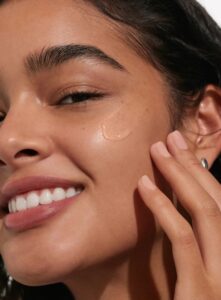
Protecting Your Skin Against UV Damage Year-Rou
- You’re not alone if you’ve ever believed that sunscreen is only required for sunny walks outside or beach days.
- Summer Skin Care Hacks I used to be among the many people who thought that remaining inside meant there was no chance of solar harm.
- However, I discovered the hard way that sunscreen is a must and that UV rays are cunning after observing pigmentation and uneven skin tone while spending the majority of the day indoors.
- Your skin is still susceptible to UVA rays, which cause severe skin damage and premature aging, whether you’re working from home, driving, or just sitting by a window.
- Globally, dermatologists emphasize that the most crucial component of any skincare regimen, particularly in the summer, is applying sunscreen.
- UVA rays can get through windows and reach your skin indoors, speeding up aging symptoms including wrinkles, fine lines, and hyperpigmentation.
- UVB rays cause sunburn and are stopped by glass.
- Because of this, even indoors, you need to wear a broad-spectrum sunscreen that blocks UVA and UVB rays.
- Your skin is still vulnerable to gradual, unseen damage if you don’t have this protection.
Here’s how to choose and apply sunscreen effectively:
- Look for key ingredients like zinc oxide, titanium dioxide, avobenzone, or Mexoryl SX for optimal UVA protection.
- Apply at least two fingers’ length of sunscreen for your face and neck.
- Don’t forget often-missed areas like the ears, back of the neck, and hands.
- For makeup users, consider a setting spray or compact with SPF for midday touch-ups.
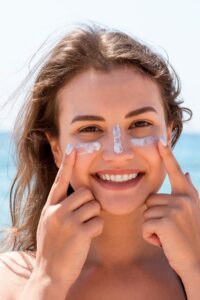
Tip for Indoor Sunscreen Use
- Select sunscreens with antioxidants like vitamin C or niacinamide if you spend the most of your day near windows or use electronics that emit blue light, such as laptops and phones.
- These provide an additional line of defense against free radical damage and oxidative stress, two factors that hasten the aging process of the skin.
3 hydration is More Than Just Drinking Water
Why Topical Moisture Matters Just as Much as Internal Hydration in Summer
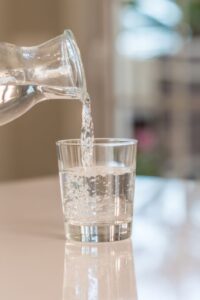
- The adage “Drink more water for glowing skin” is one that we have all heard. Although it’s important to stay hydrated internally, I soon discovered during one really hot summer that this isn’t always the case.
- Before I realized the benefits of topical hydration, my skin continued to feel tight, dry, and lifeless even though I was drinking liters of water every day.
- In actuality, even if your body is well hydrated on the inside, summer heat, sun exposure, and air conditioning may quickly dehydrate your skin, leaving it parched on the outside.
- For this reason, it’s essential to include a quality moisturizer in your skincare regimen.
- Prominent dermatologists stress the need of both internal and exterior hydration.
- Topical moisturizers assist seal in moisture and shield the skin barrier from outside aggressors, while drinking water supports skin from the inside out and helps maintain overall body functions.
- Your skin constantly loses water during the summer because of the high temperatures and sun exposure. Lightweight, water-based moisturizers are useful in this situation.
- They give a surge of moisture without clogging your pores – great for people prone to oiliness or breakouts in warm weather.
Hyaluronic acid, a naturally occurring molecule in the skin that can retain up to 1,000 times its weight in water, is a component of moisturizers that are regularly recommended by scientific studies and skincare specialists. It draws moisture into the skin like a sponge, keeping it plump and supple.

- Other advantageous components consist of:
- Another humectant that aids in binding water to the skin is glycerin.
- Vitamin B5 (panthenol): Hydrates and soothes.
- Aloe Vera: Reduces inflammation and cools skin that has been exposed to the sun.
- In the summer, a non-comedogenic product is crucial to preventing acne and clogged pores, particularly if you have oily or mixed skin.
- Here’s how to make the most of your summer moisturizer:
- Apply it immediately after cleansing while your skin is still slightly damp — this helps lock in moisture more effectively.
- Use it both morning and night, even if your skin feels oily.
- Don’t skip it thinking it’ll make your skin greasy — lack of hydration often triggers more oil production as your skin tries to compensate.
- Hack: A Summertime Cooling Technique
- Your moisturizer should be kept in the refrigerator. In addition to feeling revitalizing, using a cold moisturizer helps soothe inflamed skin and lessen puffiness, particularly after sun exposure.
4. Ice It Up: Use Ice Cubes to Shrink Pores
A Simple Cooling Hack to Soothe Skin and Reduce Oiliness Instantly
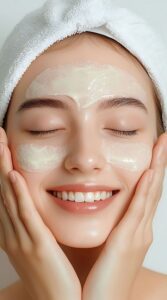
- Coffe Chocalate Face Scrub
- Ever feel your skin appears lackluster, bloated, or too oily during summer? I’ve been there. Including ice treatment in my beauty routine was one of the simplest and most revitalizing tips I found.
- Particularly when your skin feels exhausted or overheated after a long day in the sun, it takes less than a minute, costs nothing, and produces effects right away.
- I began massaging my face gently every morning with a couple of ice cubes wrapped in a soft muslin towel.
- My skin felt dramatically smoother, tighter, and less puffy in a matter of days.
- Dermatologists and skincare specialists claim that cold therapy, sometimes referred to as cryotherapy, can help temporarily tighten skin by constricting blood vessels. When properly used, ice can:
- Reduce the visibility of pores
- Cut down on inflammation and oiliness in acne
- soothe skin that is inflamed or sunburned.
- Increase blood flow to give your skin a more radiant appearance.
- Due to its natural advantages and speedy results, this easy technique, which has been a beauty secret for decades, is now being adopted by both skincare specialists and influencers.
- Many dermatologists recommend the use of cryo facials and cold compresses because of their anti-inflammatory properties.
- Applying cold reduces redness and puffiness, particularly beneath the eyes, by constricting the skin.
- It’s the ideal summertime trick because it can also momentarily improve the tone and firmness of the skin.
- After a facial, ice globes or cryotools are frequently used in professional skincare settings to help soothe the skin.
- However, if you apply it carefully, a basic ice cube works just as well as more complex equipment.
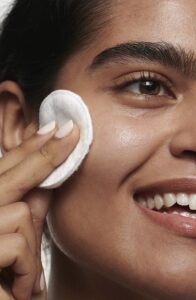
- To benefit from icing your skin in a safe manner:
- To prevent frostbite or irritation, never put ice directly on your face. Instead, wrap it in a soft towel or use an ice roller.
- Pay attention to regions (such as the cheekbones, under-eyes, and T-zone) that have noticeable pores, puffiness, or irritation.
- To prevent overexposure, keep application to 1-2 minutes per session.
- Infuse your ice cubes with cucumber juice, rose water, or green tea for extra skin benefits.
5. Exfoliate Only Twice a Week
Why Less is More When It Comes to Exfoliation in Summer
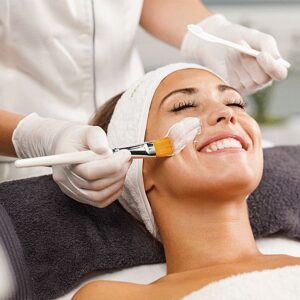
- I used to exfoliate practically daily in my early skincare days in the hopes of removing the oil, perspiration, and filth that summertime brings.
- However, I ended up with redness, inflammation, and more breakouts rather than radiant skin.
- I discovered then that excessive exfoliation is more detrimental than beneficial, particularly during the summer when the skin is already stressed by the heat and sun.
- I now strictly adhere to the “twice-a-week rule,” and my skin has never been more relaxed, smooth, or healthy during the warmer months.
- Dead skin cells must be removed by exfoliation in order for new, healthy skin to appear. But too much exfoliation, particularly with physical scrubs, can weaken your skin’s protective layer, making you more sensitive, dry, and even vulnerable to sunburn.
- Your skin is inherently more susceptible during the summer. Your skin is already under stress from heat, perspiration, and UV rays. Excessive exfoliation causes your skin to become even more reactive by removing vital lipids that shield it.
- Dermatologists advise against using harsh chemical exfoliants, like those that contain beta hydroxy acids (BHAs) or alpha hydroxy acids (AHAs), more than twice a week.
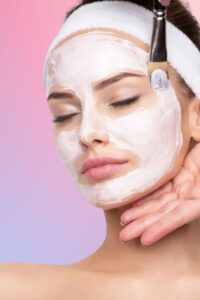
- A gentler and more regulated method of removing dead skin is provided by chemical exfoliants. Here are some compounds that dermatologists recommend:
- Lactic Acid (AHA): Ideal for dry or sensitive skin types, this mild exfoliation also moisturizes.
- Glycolic Acid (AHA): Enhances skin tone and texture by penetrating deeper into the skin.
- Because it unclogs pores and lowers inflammation, salicylic acid (BHA) is perfect for oily and acne-prone skin.
- Dead skin cells can be removed without washing thanks to these acids, which break the connections that hold them together. This lessens dullness, blackheads, and oil accumulation without harming your skin.
- How to exfoliate in the summer safely and successfully:
- Exfoliation should only be done twice a week; consistency is more crucial than frequency.
- Because exfoliated skin can be more sensitive to sunlight, use your exfoliator at night.
- Always use a moisturizer afterward to calm and replenish the skin’s moisture.
- The following day, generously apply sunscreen to shield your newly exposed skin from UV rays.
- Don’t use exfoliants on days when you’re feeling very dry or burnt.
6. Use Antioxidant Serums in the Morning
Protect and Brighten Your Skin with the Power of Antioxidants
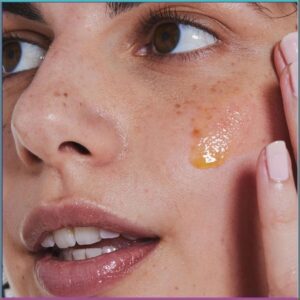
- I discovered a few summers back that my skin still appeared uneven and lifeless even though I was applying sunscreen every day.
- I discovered after speaking with a doctor that pollutants and UV radiation produce free radicals, which harm skin cells and hasten the aging process.
- The answer? My morning regimen now includes an antioxidant serum, particularly one that contains vitamin C.
- My skin appeared lighter in a matter of weeks, and I saw less sun damage and black patches.
- Vitamin C serum is now an essential part of my summer skincare routine because of the noticeable effect that just one adjustment made.
- Unstable chemicals known as free radicals are created by stress, pollution, and sun exposure.
- They damage the collagen and elastin in your skin, which results in discoloration, dullness, and early aging.
- These free radicals are neutralized by antioxidants, preserving skin health and avoiding long-term harm.
- Dark Spot Serums are among the best methods for supplying antioxidants to the skin.
- These are fast-absorbing, lightweight compositions that function at the cellular level and may deeply penetrate the skin barrier.
- Your skin experiences everyday oxidative stress, which can be prevented and repaired by using an antioxidant serum in the morning.
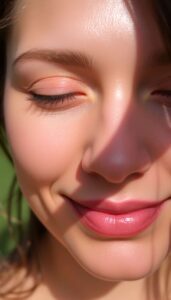
- One of the most studied and validated antioxidants in skincare, according to dermatologists, is vitamin C. It
- increases the synthesis of collagen
- Dark patches and hyperpigmentation fade
- improves the effectiveness of sunscreen
- makes skin tone more radiant
- For better effects, experts advise combining vitamin C with additional antioxidants. Popular options consist of:
- Vitamin E: An antioxidant that is fat-soluble and helps to nourish and calm skin. Its potency increases when paired with vitamin C.
- Vitamins C: and E are stabilized by ferulic acid, which boosts their effectiveness and guards against UV-induced skin aging.
- Niacinamide (Vitamin B3): Provides antioxidant protection, strengthens the skin barrier, and improves skin texture and redness.
- How to incorporate antioxidant serums into your summertime skincare regimen:
- Before using a moisturizer or sunscreen in the morning, apply this to clean, dry skin.
- Just a few drops are sufficient; gently massage them into your face and neck.
- To ensure protection, apply a broad-spectrum sunscreen with an SPF of 30+ afterward.
- Because vitamin C serum is sensitive to light and air, keep it in a cool, dark place to preserve its potency.
- For the best results without discomfort, pick a serum that contains 10–20% vitamin C.
- Expert Advice: If you’ve never taken vitamin C before, start with a lesser dosage (5–10%) and increase it gradually as your skin becomes used to it.
7. Switch to Non-Comedogenic Products
Let Your Skin Breathe—Without Sacrificing Hydration or Coverage
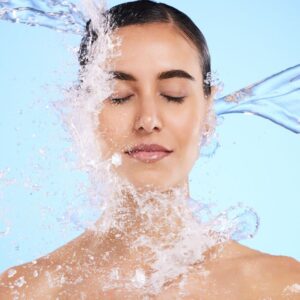
- No matter how carefully I washed or moisturized during the hottest part of the summer, my skin would still break out.
- I changed my routine to include non-comedogenic products when a dermatologist informed me that my products were comedogenic, meaning they clogged my pores.
- As a result, even on the warmest days, the skin was lighter, healthier, and more permeable.
- This single switch changed everything, particularly in humid climates where perspiration and oil production naturally rise.
- The phrase “non-comedogenic” refers to a substance that is made especially to avoid clogging pores.
- This is especially important in the summer, when heat and humidity cause your skin to produce more sebum, or oil, which increases the likelihood of acne, blackheads, and outbreaks.
- Heavy creams can cause congestion, trap perspiration and grime, and sit on your skin even if you don’t have acne.
- In order to prevent accumulation and irritation, dermatologists advise using skincare and makeup products that are lightweight, oil-free, and non-comedogenic during the warmer months.
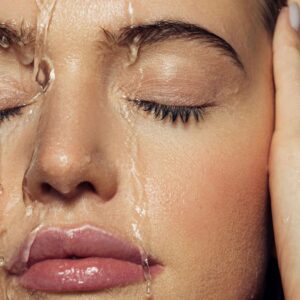
- Here’s how to create a summer skincare regimen that isn’t comedogenic:
- Cleanser: Choose a mild, foamy cleanser that is marked as “sulfate-free” and “non-comedogenic.” It should wash without drying out too much.
- Moisturizer: Select a lotion, gel, or water-based type that hydrates without leaving your skin feeling oily.
- Choose a broad-spectrum, non-comedogenic sunscreen with a matte or gel texture to cut down on shine.
- Makeup: Look for terms like “dermatologist-tested,” “oil-free,” “matte,” or “won’t clog pores.”
- Generally speaking, the following ingredients are non-comedogenic:
- Acid hyaluronic
- Glycerin
- Vera aloe
- Niacinamide
- Titanium dioxide or zinc oxide (found in mineral sunscreens)
- Avoid the following ingredients in comedogenic products, especially if you have oily or acne-prone skin:
- Coconut oil
- Lanolin
- Myristate isopropyl
- Butter from cocoa
- Extract from algae
- To confirm that the things you’re utilizing are truly non-comedogenic:
- Verify the label at all times; reliable brands will emphasize this phrase on the container.
- Patch-test new products before using them completely if you have breakouts frequently.
- Remember to take care of your hair; thick oils or conditioners might clog the pores on your hairline and forehead.
- The term “natural” does not necessarily indicate that a product is not comedogenic. Read the ingredients at all times.
- Summer Bonus Tip: Instead of using foundation, use a tinted moisturizer or non-comedogenic BB cream with SPF that combines sun protection, moisture, and coverage.
8. Avoid Makeup When You Can
Let Your Skin Breathe and Glow Naturally This Summer
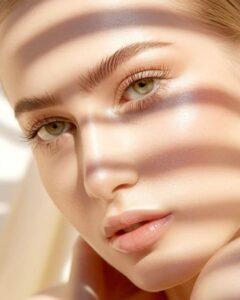
- On a weekend beach trip last summer, I made the decision to forgo wearing a lot of makeup.
- Rather, I just applied moisturizing lip balm, waterproof mascara, and tinted sunscreen.
- I had less breakouts that week in addition to my skin feeling lighter and fresher every day.
- It helped me realize that, particularly in hot weather, sometimes less really is more.
- Since then, my skin has praised me for wearing less makeup on warmer days.
- Sweating, increased humidity, and warmer temperatures during the summer can all combine with cosmetics to clog pores and result in breakouts.
- Congestion, acne, and dullness are caused by the sticky film that foundations and powders form when combined with perspiration and oil.
- Dermatologists advise against using heavy makeup on your skin during the warmer months.
- This does not imply giving up coverage completely; rather, it means choosing skin-friendly substitutes that protect and improve your skin rather than suffocate it.
- Here’s how to keep your skin looking bright and fresh without sacrificing its health:
- As an alternative, use a tinted sunscreen with broad-spectrum protection (SPF 30 or greater) in place of your usual foundation. It protects you from UV rays and even out your skin tone.
- Choose a BB cream with SPF if you require a little more coverage. Your complexion is hydrated, protected, and smoothed all at once with these multipurpose products.
- Avoid using a lot of powders and contouring. Let the natural glow of your skin show instead.
- Minimal Makeup Essentials for Summer:
- SPF-containing tinted moisturizer or BB cream
- Waterproof mascara that doesn’t get smudged by perspiration
- Lip balm that has been tinted to moisturize and provide a slight flash of color
- Skincare-benefitting setting spray (optional)
- Here are some expert skincare-backed suggestions for days when you don’t wear makeup or wear very little:
- Always wash your face well at night, especially if you used makeup or sunscreen, even if it was only a light type.
- To avoid clogging, use non-comedogenic formulas for BB creams and tinted sunscreens.
- In your simplest products, look for additional skincare elements like antioxidants, hyaluronic acid, or niacinamide.
- Don’t forget to use a moisturizer; even oily skin requires hydration, particularly when using SPF-containing products.
9. Keep Blotting Papers Handy
Control Shine on the Go Without Ruining Your Look

- No matter how matte my makeup was in the morning, I would notice that my T-zone was getting shiny by the afternoon during my workdays during the height of summer.
- Continuous powdering simply made it appear unpleasant and cakey.
- I then came upon blotting sheets, a tiny skincare miracle that revolutionized my summertime regimen.
- In the middle of the day, I quickly dabbed with a blotting sheet to remove oil and shine without causing any irritation to my skin or upsetting my makeup.
- These little sheets provide rapid freshness and oil management wherever you are, be it in the sun, at the workplace, or on the road.
- Blotting papers are absorbent sheets that are specifically made to remove excess oil from your skin without drying it out or removing makeup.
- They are mild, non-abrasive, and don’t interfere with your skincare or makeup base like tissues or wipes do.
- They are especially helpful in the summer, when sweat and oil production rise and sebaceous glands are more active.
- This is especially apparent for those with combination or oily skin.
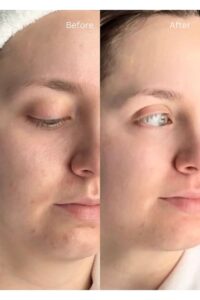
- Blotting papers are suggested by physicians and beauty specialists for summer skincare for the following reasons:
- Principal Advantages:
- Eliminates surplus oil instantly: helps lessen the oily appearance, particularly on the T-zone (the forehead, nose, and chin).
- Prevents clogged pores: Blotting sheets may help lessen the likelihood of breakouts by gently eliminating surface oil.
- Preserves makeup: Blotting doesn’t remove your basic makeup, unlike constantly reapplying powder.
- Portable and hygienic: Blotting papers are easy to carry in your pocket or handbag because they come in pocket-sized packs.
- Use it in the afternoon, when oil production is at its highest, for midday shine.
- after exercising or after spending time in the sun.
- prior to reapplying sunscreen or makeup to prepare the skin.
- To maximize the benefits of blotting papers:
- Don’t rub; press gently. Rubbing might change your makeup and aggravate your skin.
- Avoid overusing: Limit your use to two to three times per day to prevent depleting your skin’s natural oils.
- Make an informed decision: Choose blotting sheets that are free of harsh substances, non-comedogenic, and scent.
- Pro Tip: If you care about the environment, there are now eco-friendly and biodegradable blotting sheets that are produced from rice paper or bamboo.
10. Don’t Forget Your Lips and Eyes
These Delicate Areas Deserve Extra Care Too
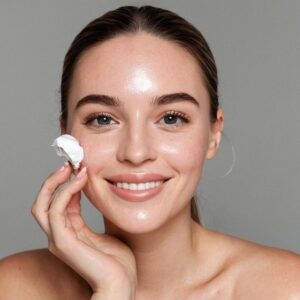
- Most individuals concentrate on their face, including the forehead, cheeks, and chin, while creating a summer skincare routine, but they frequently ignore the lips and under-eyes, two of the most delicate areas.
- I had to learn this lesson the hard way. My face looked fantastic after a long day at the beach, but my lips were parched and my under-eye area was puffy and inflamed.
- Targeted care for these areas has now been an essential component of my daily regimen.
- Especially in the summer, your lips and under-eyes are more susceptible to sun exposure, dehydration, and puffiness since their skin is thinner and more sensitive than the rest of your face.
- For Your Lips:
- Use an SPF-infused lip balm. Sunburned lips can be painful and lead to peeling or long-term pigmentation. Choose a broad-spectrum SPF 15 or higher lip balm with hydrating ingredients like shea butter or vitamin E.
- Reapply frequently, especially after eating or drinking.
- For Your Eyes:
- The under-eye area can easily become puffy or dehydrated due to heat and fatigue.
- A cooling eye gel or hydrating under-eye cream in the morning helps reduce puffiness, calm inflammation, and lock in moisture.
- Ingredients to look for: Caffeine (reduces puffiness), hyaluronic acid (hydrates), and peptides (strengthen skin).
- Skin specialists and dermatologists stress that ignoring these regions can hasten the appearance of noticeable aging, such as dark pigmentation on the lips or fine wrinkles around the eyes.
- Easy Fix: Keep your eye gel or cream refrigerated. In addition to increasing circulation and decreasing puffiness, the cooling impact is very calming on a hot morning.
FAQS
.
